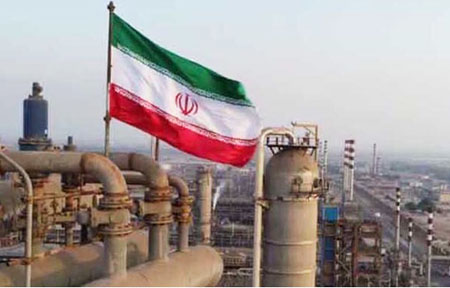Special to WorldTribune.com
 By John J. Metzler, November 16, 2023
By John J. Metzler, November 16, 2023
As violence explodes throughout the Middle East, from Gaza to Yemen, and Syria to Iraq, the political fingerprints of the Islamic Republic of Iran become increasingly obvious on this regional tableaux of terror.
Long deemed a State Sponsor of Terrorism, Iran’s Islamic rulers have funded nearly a dozen regimes and proxy movements which directly challenge regional stability and key American interests.
For background, the setting evokes the old days, where Iran’s expanding oil sales and high petroleum market prices are boosting state revenues and thus fueling Teheran’s policy ambitions.
Look at the map. Iran’s sponsored Hamas terrorists have attacked Israel in the most horrific way; a far more dangerous proxy Hizbullah in Lebanon threatens to spread the current conflict.
On Oct. 7, barbarous Hamas attacks into Israel killed at least 1,200 civilians including 31 Americans. Equally they seized over 220 hostages and brought them into the labyrinth of Gaza.
Teheran also assists Palestinian Islamic Jihad. In the meantime, Iranian backed Houthi operatives in Yemen attack shipping and pose a threat to Saudi Arabia. The Assad regime in Syria has reasserted its control with the direct aid of Iran’s Revolutionary Guards and locally supported militia along with Russian airpower.
Nearly totally overlooked has been Iranian sponsored rocket attacks on American forces in Iraq, across remote areas of Syria; 58 attacks have injured many U.S. troops.
|
Trump’s move crippled Iran’s petroleum industry, with its oil exports falling from 2.8 million barrels per day in 2018 to 100,000 bpd in 2020, according to Reuters. Yet Iran’s production has ramped up to 1.4 million barrels a day in October. |
Since its inception in 1979, the Islamic Republic of Iran has become a revolutionary springboard and paymaster to a gaggle of terrorist organizations; The regime has equally come dangerously close to developing nuclear weapons.

Though Iran’s regime is heavily sanctioned internationally which has curtailed Teheran’s theocratic rulers’ ambitions, the economic tides may be changing. Iran is once again exporting more than a million barrels of oil a day to China, Syria and the United Arab Emirates.
The Peoples’s Republic of China is Iran’s primary petroleum market with 1.7 million barrels a day (bpd) shipped in August, 1.2 (bpd) in September and 1.1 (bpd) in October. Transport is carried out via a shadowy network of merchant tanker ships.
But weren’t Iranian oil sales sanctioned? Yes. Former President Donald Trump reimposed sanctions in 2018 when he withdrew from the Obama Administration’s 2015 Iran nuclear deal.
Trump’s move crippled Iran’s petroleum industry, with its oil exports falling from 2.8 million barrels per day in 2018 to 100,000 bpd in 2020, according to Reuters.
Yet Iran’s production has ramped up to 1.4 million barrels a day in October. Iran holds massive petroleum and natural gas reserves.
“Since the start of the Biden Administration, Iran has exported well north of $80 billion worth of its oil. Billions are, in turn, given to terror proxies. Hamas alone receives $100 million each year from its Iranian patrons, with horrific results,” cites the monitoring group United Against Nuclear Iran. Such revenues support research and development of Iran’s long-sought nuclear weapons program.
|
‘Since the start of the Biden Administration, Iran has exported well north of $80 billion worth of its oil. Billions are, in turn, given to terror proxies.’ |
U.S. Sen. Joni Ernst (R-Iowa) slammed President Biden for his refusal to enforce existing sanctions, lining the pockets of the Iranian regime with more than $80 billion. Sen. Ernst is fighting to enforce existing U.S. sanctions on Iranian oil exports.
So, what can be done?
The recent Asia-Pacific Economic Cooperation (APEC) Summit held in San Francisco, brought together 21 regional countries to focus on free trade, food security, health, anti-corruption among other concerns.
U.S. President Joe Biden met with China’s Chairman Xi Jinping for a series of tough discussions on the summit sidelines. Besides reviewing the frayed Sino/American trade relationship, four hours of candid but constructive talks produced no major breakthroughs in bilateral ties.
While Biden and the U.S. delegation focused on the fentanyl narcotics scourge in the U.S., renewing closer US/PRC military communications, and China’s continuing military threats to democratic Taiwan and the South China Sea, there was no specificity regarding Iran’s role in the Middle East. Thus, follow up discussions should stress:
- Iranian oil sanction enforcement as well as North Korean missile firing curtailment; Both Teheran and Pyongyang bypass, evade and flout U.S. and United Nations sanctions.
- Significantly the U.S. should discreetly pressure partner states such as Malaysia, Singapore and Indonesia over third party Iranian petroleum transfers to Mainland Chinese ports.
- Develop new maritime enforcement protocols among key allies such as Australia, New Zealand and Japan to monitor third party merchant ships carrying Iranian petroleum.
Let Iran know we are watching and monitoring their illicit oil trade with China; And we’ll toughen enforcement. And let China know [as President Trump had a gift for doing] that the United States is serious about Iran.
John J. Metzler is a United Nations correspondent covering diplomatic and defense issues. He is the author of Divided Dynamism the Diplomacy of Separated Nations: Germany, Korea, China (2014). [See pre-2011 Archives]
